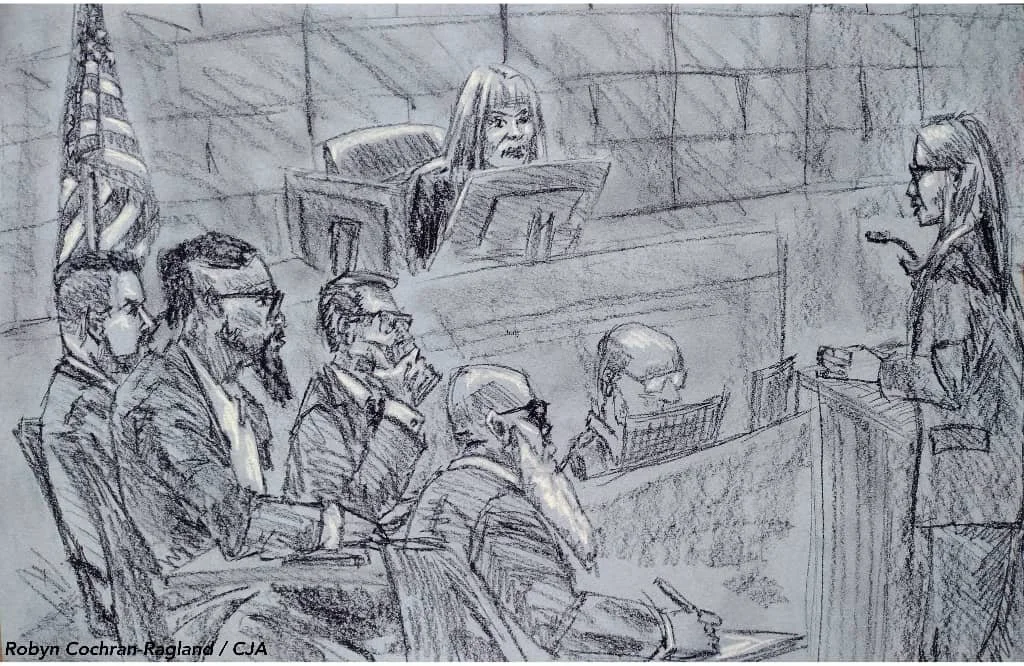Michael Correa’s First Torture Victim Identifies Him in Court
Michael Correa in black suit and glasses, middle left, © Robyn Cochran-Ragland/CJA
By Yusef Taylor, @FlexDan_YT
Denver, Colorado — 8th April 2025
The trial of Michael Sang Correa took a harrowing turn on 8th April 2025, as his first alleged torture victim took the stand and pointed him out as one of the men responsible for his brutal mistreatment nearly two decades ago. The powerful testimonies delivered in the Denver District Court, Colorado, cast a harsh spotlight on former Gambian President Yahya Jammeh’s reign and the network of enforcers who helped sustain his dictatorship through fear and violence.
Expert Witness Sets the Stage
The prosecution began by calling Professor Maggie Dwyer, a respected scholar of West African history and security. As an expert witness, she explained how Jammeh, after seizing power in a coup, deliberately expanded and destabilised the security sector to prevent internal threats. According to Dwyer, Jammeh’s regime was characterised by a delicate balance—while he relied heavily on the military, he feared its potential to unseat him.
To secure his hold on power, Jammeh created overlapping security agencies, rotated key personnel unpredictably, and encouraged rivalry among institutions. This strategy, known as “coup-proofing,” aimed to prevent any coordinated effort to remove him. Dwyer noted that while the government claimed multiple coup attempts—some with little to no evidence—around 10 to 12 were reported during his time in office.
When asked about the 2006 failed coup, Dwyer detailed the involvement of then Chief of Defence Staff Ndure Cham and the Director of the National Intelligence Agency (NIA), both of whom attempted to overthrow Jammeh. After the plan failed, Cham fled to Senegal.
Dwyer also clarified that the National Assembly was present, elections were held, and the judiciary was present, so Jammeh did not wield absolute power. Lawyer Belcher pushed back, asserting that most of the National Assembly were under Jammeh and in theory there were checks and balances, but what Jammeh said was the law. She responded, “That’s correct.”
Belcher also drew historical parallels to earlier Gambian governments, discussing regional military cooperation with Senegal and the civilian-led "Taxi Driver Coup" that was suppressed by Senegalese forces. He referenced the disbandment of the Gendarmerie in 1992 and the execution of soldiers during the “Night of Terror” on November 11, 1994—early signs of Jammeh’s brutal consolidation of power.
Alieu Jobe’s Heartbreaking Testimony
The courtroom grew silent as the second witness, Alieu Jobe, took the stand. At the time of the 2006 failed coup, Jobe was employed at the Office of the Accountant General. He testified that Ndure Cham approached him to recruit another security officer. Jobe declined and attempted to discourage Cham.
After the coup failed, Jobe sent Cham D5,000 and later learnt that Cham had escaped the country. Not long after, Jobe was arrested by Musa Jammeh, then President Jammeh’s personal security officer, and taken to the NIA and eventually to Mile 2 Prison—where he would spend nine years and four months, including four years in solitary confinement.
Jobe described being thrown into “Bambadinka”—the infamous solitary wing known as “the hole.” He was tortured nightly and kept in a filthy, urine-soaked cell with a concrete slab for a bed and a piss pot for a toilet. His testimony included chilling details of torture: he was taken before an interrogation panel, forced to kneel with hands cuffed behind his back, and had a plastic bag placed over his head. The panel included Ousman Sonko and eight others.
Photographic evidence was shown in court depicting the NIA building and the torture sites. Jobe described how, after repeated torture sessions, he was paraded on national television to “apologise to the country” and eventually gave a coerced confession in an attempt to save his life.
Naming the Junglers
During his testimony, Jobe identified several members of the Junglers—the feared paramilitary group loyal to Jammeh—whom he said tortured him. Among them, he named Sanna Manjang, Rambo Jatta, Bai Lowe, and Michael Sang Correa. Jobe confirmed that he had known Correa before his arrest but not personally.
He testified that after one particularly brutal session, he was told he would "regret being born" if he came back. His health deteriorated—he suffered chronic back pain, underwent two surgeries, and lost vision in one eye due to glaucoma.
Jobe also spoke of witnessing the torture of fellow prisoner Pierre Mendy, who was seen bleeding from a head injury. From his cell in the Security Wing of Mile 2 Prison, Jobe watched Mendy being dragged to and from torture sessions.
Despite being held without charge for months, Jobe was eventually tried for treason and conspiracy to commit treason and sentenced to 20 years. He was released in July 2015 after receiving a presidential pardon.
Defense Strategy Leads to Conferment With Judge
Throughout Jobe’s testimony, the defence repeatedly objected—particularly when prosecutors asked if he knew why he had been arrested, citing lack of personal knowledge. Occasionally, the courtroom was filled with white noise while the judge, prosecutors, and defence conferred privately through headsets, shielding their conversations from public hearing.
In cross-examination, defence attorney Belcher focused on inconsistencies and asked Jobe about his previous testimony to The Gambia’s Truth, Reconciliation, and Reparations Commission (TRRC). Jobe reaffirmed that Michael Correa was among his torturers and said his experience marked the first time he had truly understood the scale of torture under Jammeh’s rule.
Our next publication will reveal the atrocities meted out to Yaya Darboe. Below are links to previous publications on the Michael Correa trial.
Prosecutor and Defense Put Up Vivid Opening Statements on Landmark Correa Torture Trial
U.S. Court Opens First-Ever Universal Jurisdiction Trial Against Non-Citizen for Torture

